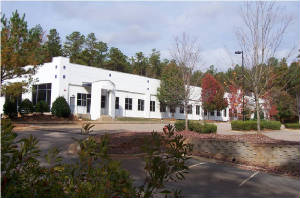|
Overview
The Healing Place of Wake County is a non-profit 501(c)(3) recovery and rehabilitation facility for homeless
people with alcohol and drug dependency.
Our mission is to offer innovative recovery and rehabilitation to homeless men and women addicted to
alcohol and other drugs. This is done by providing a continuing mutual-help program. The program is specifically designed
to rekindle the client's desire to return to a productive life.
Over 70 percent of our clients are sober and productive members of society one year after graduation.
The Healing Place of Wake County operates a Men's Facility located at 1251 Goode Street, Raleigh, NC and
a Women's Facility located at 3304 Glen Royal Road, Raleigh, NC.
| The Healing Place Women's Facility |

|
Our Programs
The Sobering Up Center at the men's facility, with its 22 beds, provides a caring environment
where a client can be safely detoxed. The women's facility has a 10 bed Sobering Up Center. Here, clients are encouraged by
the staff and their peers to commit to the next phase of recovery through the Off-the-Street Motivational Program.
Our centers offer an alternative to emergency rooms, jails or the streets. It is a common-sense
approach to dealing with homelessness and addiction because it allows residents who are sober to have an impact on those who
are in detox. If a person chooses to work towards sobriety, clients then move into the Off-the-Street Motivational
Program.
The Off-the-Street Program is the first phase of the recovery program. It is
designated as a "motivational track," where clients are educated about the disease of addiction. In exchange for attending
Recovery Dynamics classes and AA meetings, a homeless person is guaranteed a bed each night.
Advancement in the program is based upon the total number of AA, Cocaine Anonymous, or Narcotics Anonymous
meetings attended. Education about addiction is central to our program. A homeless person gains knowledge that will
help keep them off the streets.
|
 |
The average length of time spent in Off-the-Street is 8 to 10 weeks, after which a client may enter
the recovery phase.
Clients in the Phase II Recovery Program have living quarters that are like dormitories.
There are 46 beds in the men's facility and 28 at the women's facility.
The homeless client is now part of a community. Each resident receives a job assignment.
Responsibilities range from basic maintenance to clerical duties, cafeteria duties, building and grounds maintenance, security,
and office support .
At this stage, responsibility is essential as a resident moves beyond sobering up. Clients attend classes
to complete the 12 Steps of Alcoholics Anonymous; work with new residents in the program; and complete a Ready to
Rent Class and a Life Skills class through Wake Technical Community College. Wake Tech also teaches GED
classes. A resident spends an average 4 to 6 months in the Recovery Phase.
The Phase II Transitional Program is a resident’s final stage at The
Healing Place. At the men's facility there are 36 beds available and 24 at the women's facility for those individuals who
have successfully completed the educational program.
A resident is now developing a lifestyle and understanding about choices that will support ongoing sobriety.
Phase II provides a resident with resources to move back into society as a self-sufficient, tax-paying and sober citizen.
While living in this supportive environment, a former homeless client receives help gaining employment, opening a bank
account, resolving outstanding legal issues and finding independent housing. A resident will stay in this transitional
program for 3 to 9 months, depending on their needs.
As a recovering addict moves towards their final stage of sobriety, there are significant
changes in their responsibilities and privileges. Now the participant may leave the property for work, meetings, or on
an overnight pass.
The Healing Place of Wake County
(919) 838-9800
|



